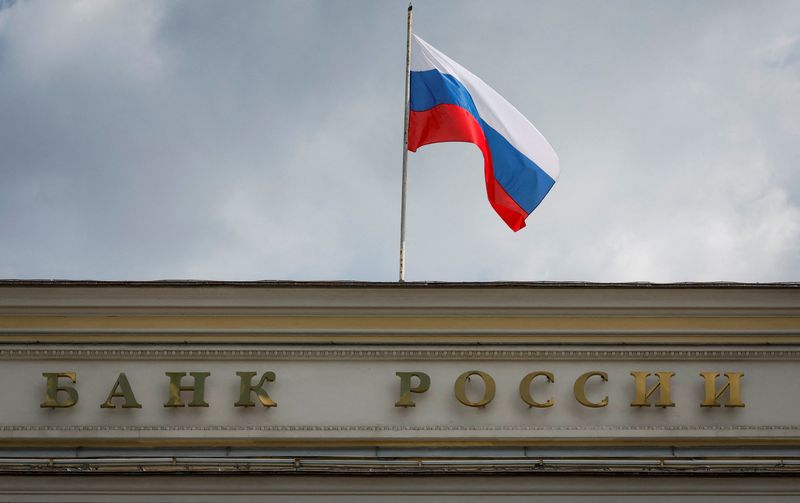By Marc Jones and Jan Strupczewski
BRUSSELS (Reuters) - The European Union is expected to move a step closer this week to seizing some of the money that has been building up on around $280 billion worth of Russian assets frozen by the West since Moscow's invasion of Ukraine in February 2022.
EU leaders want to send the money it confiscates to Ukraine. Exactly how this will be done is a complex legal issue that will set a potentially contentious precedent.
Here are some of the options on the table:
SIPHON OFF PROCEEDS
The EU estimates 210 billion euros ($229 billion) of the frozen money -- bonds and other securities in various currencies -- is held in the bloc, mainly in Euroclear, a Brussels-based central securities depository.
When those assets mature -- reach their final payout days -- they are converted into cash, which is then normally reinvested by Euroclear on behalf of the owner, in this case Russia's central bank.
EU lawyers say it would go against international norms to confiscate the assets in their entirety, but taking only the profits from the reinvested cash could be legally defended in court if Russia tried to sue.
This is why the European Commission, the EU executive, proposed "ring-fencing" the profits generated by the frozen assets from mid-February of this year, without touching the capital.
Once the proposal is formally approved by EU governments in coming weeks, Ukraine could receive from 2.5 billion to 3 billion euros net per year from such seized profits. The exact amount will depend on global interest rates.
Technically, Belgium will take the tax from the profits, but it has decided to send that money to Ukraine. Belgium expects to receive 1.7 billion euros from the tax this year, and says it would send 1.5 billion euros to Ukraine immediately and the remaining 200 million in 2025.
Once the Commission proposal becomes EU law, money from the profits would be paid out twice a year, starting in July.
Euroclear is to retain 3% of the profits to cover its operational expenses and temporarily retain 10% of the profits to cover expected litigation costs if Moscow takes it to court.
Euroclear does not expect to see the 33 billion euros it has on the Russian central securities depository account in Moscow again, as there are already more than 100 lawsuits filed in Russian courts court against it. The 10% of profits retained by Euroclear can be increased if needed.
EU officials expect Russia, through court action, to also try to seize Euroclear cash in securities depositories in Hong Kong, Dubai and elsewhere.
Their concern is that this could drain Euroclear capital and require a huge bailout of an institution that looks after about 37 trillion euros of global assets.
CONFISCATION
Some policymakers and lawyers say the Russian reserves could be confiscated in full under a doctrine of international law known as "countermeasures". The assets could then be sold or collateralised and proceeds handed to Ukraine, or to a dedicated reconstruction fund.
Others, including European countries and the European Central Bank, say this would go against international norm and could be challenged by Moscow in courts because there is no legal way to confiscate sovereign assets.
The opponents also say other countries such as China or in the Gulf would worry that the same might one day happen to their money, and look to pull their assets out of Europe's banks as a precaution, which could be destablising.
G7 countries are split on the idea, and officials close to the talks say a political deal in the G7 could take many months, if not years.
Previous examples of such seizures - including of Iraqi assets after Iraq's 1990 invasion of Kuwait and of German assets after World War Two - happened only after those wars were over. There is no end in sight to the war in Ukraine.
Sovereign debt experts have highlighted that even in the United States the International Emergency Economic Powers Act (IEEPA) does not authorise an outright confiscation of frozen Russian property in the absence of armed conflict between the U.S. and Russia.
REPARATION BONDS
"Reparation bonds" have also been suggested as a way of circumventing some legal problems. Ukraine would sell securities that pay out only if it receives war reparations from Russia.
Interest payments could also roll up and become payable only if Kyiv gets compensation.
The bondholders would not have a contractual claim on the Kremlin's frozen reserves. But as Russia is unlikely to pay up willingly, these assets would be the most likely source of cash for paying damages.
Since the reserves are accruing interest, they could be used to pay both the bonds’ principal and more regular coupon payments. This would be different from confiscation, because the assets would be transferred only if a legitimate compensation mechanism first ruled that damages were due to Ukraine.
Kyiv would have a plausible way to collect on any damages awarded up to the value of the reserves. It could therefore issue reparation bonds up to the amount of the frozen Russian assets. But it would receive anything like such a sum only if the U.S., EU governments and other allies were willing to buy the securities.
SYNDICATED LOAN
The bond idea has been fleshed out by Lee Buchheit, a legal expert in sovereign debt, and Daleep Singh, whose return to the White House as deputy national security adviser for international economics was announced in February.
Their view is that Ukraine could pledge its claim for reparations against Russia to a syndicate of allies in return for a loan. If Moscow refused to pay the damages, the allies could then use Russia’s frozen assets to pay off the loan. The justification for this is the widely recognised legal principle that, if a creditor controls a debtor's assets, it can set those assets off against an unpaid debt.
